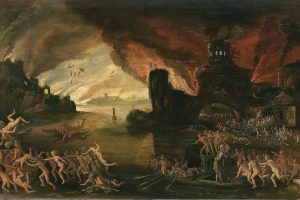How do you wish others well during the festive season: Do you say, “Merry Christmas” or “Happy Holidays”? What do you think if someone wishes you a “Good Yule”?
Christmas has become part of the culture wars—and not for the first time. In the 17th century, English Puritans banned Christmas celebrations as unbiblical. If you asked them, “Does Christmas have pagan roots?” they would reply, “Yes, and good riddance to it!” In the 21st century, some Christians think the opposite. Ask them the same question and they might become defensive.
Franciscan Father Richard Rohr urges us to go beyond “either/or” thinking. The question of Christmas origins offers us an opportunity to think beyond exclusive categories.
Folklorists affirm that pagan Europeans brought greenery indoors to decorate for midwinter. Yet our contemporary Christmas tree customs come from medieval Germany, where people added candles to their evergreens to signify the Light of the World. Conifers symbolize undying life—what could more clearly proclaim Christ’s nature?
Gift giving also hearkens back to medieval Christian practices where monasteries and feudal lords bestowed charity on those less fortunate.
But what about the date of Christmas? Is the celebration of December 25 a rebranded pagan holy day? Many websites assert that Christmas came from the Roman festival of Saturnalia, but historians have disproven that claim. Yet the dating of Christmas does come from a universal human experience.
For the first 200 years of the faith, Christians thought little about the season of Christ’s birth. Then in 235 Hippolytus posited the date followed today by Western churches—December 25. His thinking is based on the nine months of Mary’s pregnancy, counting from the annunciation on March 25. Early theologians believed that not only Christ’s conception, but also his crucifixion and the creation of the world took place on that date.
Why that date? According to professor of historical theology Father David Vincent Meconi, “The spring equinox was seen as the most fitting day for God to recreate the world with the annunciation.” Pagan and Christian philosophers in the classical world agreed that the universe was a vast web of analogies; hidden likenesses connected the tangible world with unseen truths. In the beginning, God declared, “Let there be light,” so it made sense for God’s great works to all take place on the day when light triumphs over darkness.
Ancient cultures assumed a correspondence between the natural world and spiritual verities. And such thinking still deserves consideration today. As scientific theologian Ilia Delio declares, “Everything reflects God in some way.” Now that could start an interesting Christmas conversation!
This article also appears in the December 2023 issue of U.S. Catholic (Vol. 88, No. 12, page 49). Click here to subscribe to the magazine.
Image: Unsplash/Manuel Will














Add comment